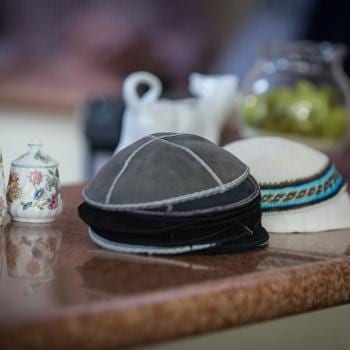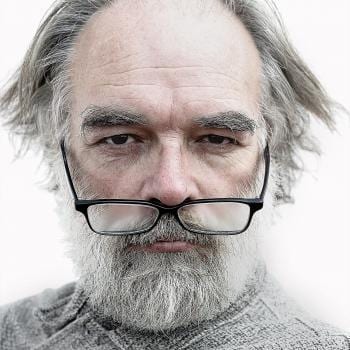The Vision, pp. 73-92
I hope y’all are ready, because you need to be.
Henry and Mary, the elderly couple we met a few weeks ago, are still driving out to the strip to watch the sex workers and their clients, and to pray for the young, skinny sex worker they call “Little Mary.”
Freezing cold nights and hot sultry evenings passed and when their worn-out bodies were desperately tired, the old couple climbed into their car in order to watch and pray fo rate one God had given them as a burden and a promise. They prayed with hearts that broke anew each time the girl got into the car of another godless stranger.
Actually, some of her clients are probably Christians.
One day Little Mary shows up with short, spiked black hair in place of her normal long almost-white blond hair. Henry isn’t sure whether the girl is actually Little Mary, but Mary assures him she is, because “girls don’t take each other’s spot.”
In the comments a few weeks back, someone noted that if Mary was a sex worker herself when she was young, she should have enough insight into sex workers’ lives to do something to help Mary beyond just pulling up in a car and watching her. She could ask her self what would have helped her—or what did help her. But instead, the only time she puts any of her personal experience to work is moments like these—when she correctly insists that the girl on the spot is Little Mary, despite her black, spiky hair.
That chilly night they watched as their little Mary got into a two-door gray Cavelier. They knew her life was in jeopardy.
How? How did they know her life was in jeopardy this night, and not any other? And why didn’t they do anything? Spoiler: her life is in jeopardy, it’s Derek who just picked her up, and he’s kidnapping her. But don’t worry, he won’t be able to get it up, and she’ll manage to fight him off, and then she’ll live in the woods for three months eating extra Y2K rations and finally build a raft and raft down a river until she comes to civilization near where Asher, Cheyenne, and all our other characters live.
I swear to you I am not making this up.
Our elderly couple, Henry and Mary, never see “their” Little Mary again, but they do keep driving out to the strip to watch for her.
They returned each evening to pray for her until five months later when Henry died peacefully in his sleep.
The frail old woman was moved into a nursing home, but her days were spent in continued prayer for the unknown girl.
Oh and after she’s in the nursing home, there’s fun weird stuff like this, too. One of the nursing home nurses asks Mary who she’s always praying for, and Mary tells her, and says she used to be a sex worker herself, and that she was “a terrible sinner just like the little Mary I pray for.”
The nurse shook her head as she said, “Poor thing. That sweet lady wouldn’t know a terrible sin if she fell into it up to her neck.”
The angel standing nearby readied himself to dispatch her prayers heavenward. His form was large nad powerful. He smiled after the ignorant caretaker. Little does she know.
The invisible warrior of God now leaned over the old lady, ministering comfort to her heart. Mary, just keep praying. Mary Magdalene still needs your prayers.
I’m getting definite Frank Peretti This Present Darkness vibes.
Okay. The bits with Henry and Mary are meant to have taken place some time back. In fact, they probably happened before Dan was killed. Derek picked up Little Mary—the last time Henry and Mary saw her—months before stalking Hope and Cheyenne and attempting to steal the brew. These months that Asher has been working at The Last Publishers, Little Mary has been eating Y2K food at the isolated cabin in the woods where Derek left her, and organizing her escape via raft down an unknown river.
By the way, the bits about the river and the cabin are all spoilers. The book doesn’t tell any of this until much later. All we know, in the book, is that we see Henry and Mary praying for this girl, and then suddenly, in the next chapter, she shows up at the side of the road, just as Omar is stuck in traffic. What we learn later is that Little Mary left the raft at the first sign of civilization: this road.
The one Omar is now sitting in traffic on.
Omar, who works for The Last Publishers, is Black. Malachi met him through his prison ministry. Omar was in jail, heard Malachi preaching and was converted; when he got out of jail, he went to work for The Last Publishers. Yes, it’s a problem that the one Black character this book has is someone they met through their prison ministry, and safely converted into a Good, Law Abiding, God Fearing Person. Not only does it type Black people as criminals, it also places Omar in a position of follower and subordinate to Malachi. Malachi reformed him. It would be better to have a Black character who was already Christian, who heard about what The Last Publishers were doing, and decided to join them, bringing needed skills.
But, on the plus side, Omar is treated as a well-respected leader within the group. Together with Asher, he leads a weekly Bible study at one of The Last Publishers’ properties. (The Bible study is at The Herb Den, the business Cheyenne runs in town; the location handles orders and shipping for the Freemans’ herb business, and it has a nice lounge area with couches.) In fact, this Bible study is where Omar is headed as the next chapter opens.
Omar has run into traffic, and as he sits and waits (things have come to a complete standstill) he notices a girl standing at the side of the road up ahead. It’s Little Mary, trying to thumb a ride. Omar feels bad for her, she’s so skinny. He sits in his car and talks to each of the cars up front of him, as though they can hear him, urging them to pick her up and get her help—because she clearly needs help.
So we get this (and more):
As though the other drivers could hear him, he began to speak to each driver that passed the girl. “Okay, You. You, in that yellow bug, stop! Did you hear me? I said stop, and help that girl!”
Five cars ahead, and old lady with beauty shop smooth hair was driving a blue Lexus. The fancy blue car with that sweet looking woman neared the girl. At the first opportunity, the old woman sped off. Omar watched the driver depart nad slammed his hand down on the steering wheel in frustration. The girl drooped against the light pole.
“This is so wrong … so wrong! Okay, now, you. Fine Christian family up there with your head covers and car full of young-un. I see you with that over-sized van. Pick that poor girl up! I tell you to do what you know is right!” Omar’s voice had taken on the cadence and swing of an old-timer preacher. Yet the large van slowly pulled into the oncoming traffic, forcing the line to break to let them onto the highway.
Vexed, Omar put his head down. “Care, people! Care! God said go into the highways and byways. Well, this here’s a highway, and we are stuck on a byway, so pick the girl up! He turned his attention to the next vehicle, featuring a bumper sticker declaring Repent or Perish. “Can’t you see she won’t repent unless someone preaches the gospel to her? She sure ain’t gonna hear you with your windows rolled up! Pick the girl up!”
But of course, they don’t.
Despite teaching parents to beat their children into submission and urging women to obey their husbands’ every command or wish, the Pearls genuinely believe they preach against legalism. They’re constantly down on families that wear head coverings or have tons of kids, on the basis that these families are legalistic. (While the Pearls believe in big families, they’re ok with birth control if the husband chooses it—they don’t believe families should necessarily let God plan their fertility.)
So why doesn’t Omar stop worrying about what the other cars are doing and decide to pick the girl up himself, when he gets up to her, you ask? Why does he want someone else to do it?
He has a reason:
“Lord, you know how much is at stake. TLP is at a critical time in the publishing. remember Malachi’s dream, Lord! And Asher, Lord, he told us how thousands of Hmong are just waiting to hear. This is just one rebellious girl who’s probably heard the gospel a thousand times and rejected it.”
This bit leaves some questions. What threat would this pose? Is Omar afraid someone will think he picked up a sex worker? What’s his deal? But then we get this:
“If I pick up a white girl, it could jeopardize the whole project. A million Muslim souls are at stake and all it would take is one lily-white teenaged girl crying foul. This whole thing would be derailed while everyone at The Last Publishers tried to defend me, God, you know she is going to cry foul! Are you listening? I’ve just got this feeling.”
And then later, he adds this:
“It would definitely not be wise for a black man with a criminal record to pick up a young white girl down here even if she is hungry and sick.”
Aha. There it is.
Now, clearly, the bit about “crying foul” is a bit sticky. But here’s the thing: many, many, many lynchings of Black men in the South were the result of a white woman “calling foul.” Even Emmett Till’s murder was the result of a white woman “calling foul.” So I don’t think this is really a reference to the idea that all women just can’t wait to accuse men of rape. I think it’s a reference to a very specific phenomenon.
Omar lives in a county that is run by white supremacists. He knows that as a Black man with a criminal record, his very existence is precarious. It wouldn’t take much to get run out of town.
Omar picks the girl up. It is strongly suggested that the traffic slowdown was engineered by God (via “military looking” men whom we are clearly expected to believe are angels redirecting traffic) so that Omar would notice and help the girl. She gets in his car and tells him he’s hungry. He drives her to the Bible study at The Herb Den, and turns her over to Cheyenne to feed her in the kitchen in the back.
When he girls had exited the room, every head turned toward Omar. Asher gave voice toe everyone’s thoughts. “That had to be scary. You okay?”
The two good friends stared hard at one another, sharing a common bond. Omar broke into a nervous smile and began to laugh in relief. “You have no idea. I think I lost ten years of my life from plain fear. Everything I love, I had to put on the line for that skinny girl, and she still might cry foul. All I can say is, she better be worth it.”
So not only is Omar plagued by a fear born of generations of racial violence … but also, every white person in his life is aware of his fear, and believes it is justified. If every Black person in America could expect such validation of their fears from the white people in their lives, this world would be a better place. It simply feels baffling to find this in a book by Debi Pearl.
Now, let’s not take that too far. While Debi hasn’t spoken directly on Black Lives Matter that I can see, Debi’s daughter, Shoshonna, posted a long screed against BLM this summer. “They’re saying my child is a white supremacist because this country will always be stained by the sins of the past,” she wrote. “My child needs to get on their knees and apologize for something they had nothing to do with. They say our history needs to be demolished complete and the country brought to a rubble and rebuilt.”
This almost makes things worse, though. The way Debi writes in this book, she appears to be aware of the problems that exist for Black people in America. Why, then, is her daughter—who is still connected to her ministry—so angry at the idea that this country is plagued by white supremacy?
Debi, by the way, also wrote a children’s book on Martin Luther King Jr. This does appear to be an issue she cares about, however short she ultimately falls on it.
So. Who is this girl?
Quick note. Some readers of this series have said that this book is boring. It’s true. What keeps this story interesting for me is how outlandish the details are, not the writing. For example:
Now it was Malachi’s turn to give his version of a Paul Harvey impression. “How I want to hear the rest of the story!” He nodded toward the back of the store where Cheyenne and the strange girl had disappeared. “Truthfully, I want to hear the whole story, but her because I only have twelve minutes before I need to leave for Missouri, and I’m not about to get out of here until I know what is going on.”
Malachi put up his hands once again. “Wait … I just remembered. Asher is leaving for Thailand tomorrow to help distribute the Hmong translation of the God’s Story book. Before I leave, we need to lay hands on him and pray. Much to my chagrin, I will have to hear the rest of the story from Omar when I get back.”
No one talks like this. No one.
We have a quick jump back to the nursing home, where Old Mary died with the words “Thank you Lord; I knew you would take care of my Mary” on her lips. So apparently God was only keeping Old Mary alive so that she could keep praying that he would help Little Mary … which, no, does not make sense.
There’s also a random footnote about the Hmong people. Debi writes that one of her sons took flying lessons with an old Vietnam veteran who told stories about working with the Hmong to blow up elephant caravans carrying supplies during the Vietnam War. There is no point to this story. Well, except perhaps for this, which is a bizarrely large non sequitur:
“Their involvement in Vietnam made them a people without a land. … Yet they have always kept their own language, speaking and reading. Almost everywhere they have been their language is banned, yet all their children can read Hmong. They are the most homeschooled people group on earth.”
This evangelizing the Hmong thing is such a bizarre side-story. The Hmong who fought with the Americans in Vietnam were Christians! That was why they fought with the Americans! They were westernized! And there are a lot of Hmong in southeast Asia today who are still Christian.
So. Let’s see how things go as “Little Mary” settles in.
“What’s this place?” The girl looked around nervously. “It smells so strange.”
Cheyenne laughed as she led the way down a long narrow path between high crowded shelves. “This is the Herb Den, where I make my living. That smell is the aroma of dried herbs, spices, and berries.”
Uh huh.
“My name is … uh, … It’s Ann.”
Disgusted by the obvious lie, Cheyenne stood up and walked past the girl. She busied herself at the counter behind [her]. “Poor you. That’s a bummer. I mean, you don’t really seem like an Ann. Anyways, you look more like an Esther? Or Miriam? Or … no; you are a Mary Madeleine.”
The young girl bolted to her feet, flipping over her chair, which slammed on to the concrete floor with a bang that sounded like a firecracker …
“My name is Magdalene; I don’t know how you guessed that one. I mean, who’s named that?”
Who indeed.
Okay. I’m done with this nonsense fo this week. Magdalene—for that really is new name—claims to be eighteen and kicked out of a foster home, but our omniscient narrator tells us that’s a lie. Cheyenne decides to take her home, to get her new clothes.
“I have a great shower with lots of fancy natural girly soaps, creams, and shampoos, and I know how to cut and style hair. Anyways, by tomorrow I could have you looking like a fancy New York City babe. What’a you say, Magdalene? You game?”
A dirty, suspicious face looked up at Cheyenne, trying to figure out the motive behind her kindness. Disgusted by her conclusions, Magdalene asked, “You queer?”
And there the chapter ends.
I have a Patreon! Please support my writing!










